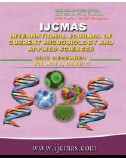


 National Academy of Agricultural Sciences (NAAS)
National Academy of Agricultural Sciences (NAAS)

|
PRINT ISSN : 2319-7692
Online ISSN : 2319-7706 Issues : 12 per year Publisher : Excellent Publishers Email : editorijcmas@gmail.com / submit@ijcmas.com Editor-in-chief: Dr.M.Prakash Index Copernicus ICV 2018: 95.39 NAAS RATING 2020: 5.38 |
Dengue fever is an arthropod borne viral disease present as either a non-specific illness, dengue fever (DF) or DHF, DSS leading to hospitalization or death. In routine laboratories diagnosis is mainly based on the detection of dengue antigens (NS1) or antibodies (IgM and IgG) by ELISA kits. Objectives of the study are to find out the seropositivity of dengue virus infection in patients admitted in a tertiary care hospital and to study the clinical presentation of dengue in serologically diagnosed cases. The study was conducted Department of Microbiology, GMC Aurangabad. Samples from Clinically suspected cases of Dengue are collected along with clinical profile and Patients were divided into two groups, Group A containing patients having fever history of 5 days or less than 5 days and Group B containing patients having fever history of more than 5 days. Serum samples from both Group A and Group B were tested by Rapid Immunochromatographic Card test (RICT). In addition to RICT, Serum samples from Group A were subjected to NS1 ELISA and serum samples from Group B subjected to IgM Capture ELISA. Out of 390 clinically suspected dengue cases 138 cases (35.38%) were serologically positive by RICT and or ELISA.111 cases were positive by RICT. In Group A (180 samples), 55 samples were positive by NS1 ELISA and In Group B (210 samples), 83 samples were positive by IgM ELISA. A total of 55 cases i.e. 30.55% (55/180) were positive for NS1 ELISA as compared to 42 Cases i.e. 23.34% (55/180) by RICT for NS1 Ag (During 1-5 days of Fever) in Group A. A total of 83 cases i.e. 39.52% (83/210) were positive for IgM ELISA as compared to 66 cases i.e. 31.42% (83/210) by RICT for IgM Ab (During 6-10 days of fever) in Group B. NS1 antigen was detectable in patient’s sera from day one of fever, IgM antibodies from day 3 onwards. Out of 138 dengue positive cases, majority of the cases i.e. 84 (60.87%) were having dengue fever without warning signs, followed by 39 cases (28.26%) cases of dengue with warning signs and 15 cases (10.86%) had severe dengue. Fever was most common clinical presentation followed by Headache, bodyache, nausea, vomiting, joint pain, abdominal pain, retro-orbital pain and rash, hemorrhagic manifestations. Hepatomegaly was the commonest clinical sign followed by ascites, pleural effusion and Splenomegaly. Death occurred in 4 (2.89%) cases. RICT provide the useful aids in screening and ELISA should be considered as the confirmatory test in diagnosis of dengue.NS1 ELISA has promising results in early diagnosis of dengue and when used in combination with IgM Capture ELISA it increases the diagnostic efficiency. Hence involvement of good laboratories for early and prompt diagnosis of dengue infection, coupled with vector control programmes and inducing awareness among the public, is needed in combating future epidemics of dengue.
 |
 |
 |
 |
 |